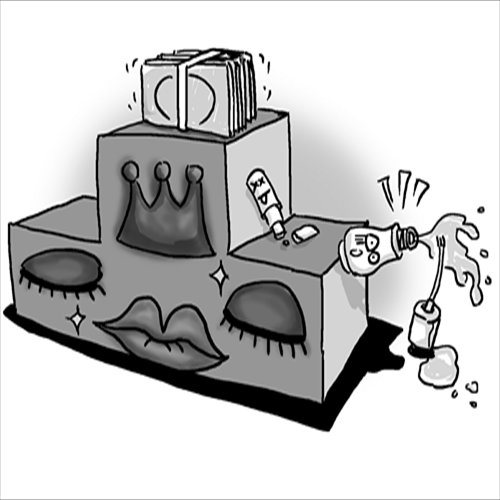HOME >> BUSINESS
Revlon overdue for China marketing makeover
By Yu Xi Source:Global Times Published: 2014-1-8 21:13:01

Illustration: Lu Ting/GT
US cosmetics maker Revlon Inc announced at the end of 2013 that it will pull the plug on its operations in China, a cost-cutting move designed to save it $11 million per year. (Also see "Getting ugly" published Tuesday.)
Revlon, which entered the country in 1996, reportedly based this decision on its poor performance in the Chinese market, which, according to its 2012 annual financial report, accounted for only 2 percent of its $1.43 billion in global net sales during that year. News of its withdrawal was followed days later by reports that Paris-based cosmetics giant L'Oreal would sideline its Garnier label in China while it conducted a major branding overhaul.
These maneuvers have revived familiar discussions concerning the travails of foreign companies in the country. Of course, competition is intensifying in China's cosmetics market - just as it is in other retail areas - with established overseas names ceding ground to homegrown rivals and online vendors offering heavy markdowns. In May, for instance, Procter & Gamble said its share in China's skin-care market was diminishing.
The flagging domestic economy isn't making the situation any easier, especially with most of the world's developed markets still digging out from downturns of their own. In fact, even Unilever Plc, a world leader in the personal care industry, was said to be mulling staff cuts in China to cope with sluggishness in the global economy.
But in the case of Revlon, while we can't fault it for lacking patience in China, perhaps the company is being too rash by exiting the market altogether. The brand is still well-known in the country, despite its anemic sales, which means that an image touch-up might help it reconnect with local shoppers.
Even as a last-ditch effort, such a play is at least worth Revlon's consideration, especially with the Chinese beauty market still showing so much potential. According to media reports, China's cosmetics market is still growing by about 10 percent annually and was worth $22.8 billion in 2012, more than double from 2008.
The ranks of China's burgeoning middle class are also rapidly swelling as the fruits of economic development seep into third- and fourth-tier cities. Cosmetics brands of all varieties - including Maybelline, a L'Oreal label and one of the most popular in China - are adjusting prices and pushing ad spending to penetrate booming central and western regions, where urbanization and income growth are feeding an appetite for cosmetics and beauty products.
Revlon clearly understood the importance of casting a wide net in China, where its products were sold in some 50 cities. However, even after nearly two decades in the country, the brand struggled to nail down a coherent marketing strategy. Product diversity looked to be another sticking point, as the brand was slow to introduce new items.
The company's vague strategy meant that its products are sold at both makeup counters in high-end shopping malls as well as mid-tier supermarkets. This sort of approach perplexed Chinese shoppers, many of whom were never quite sure where Revlon stood as either a luxury or a consumer brand. In the end, the brand failed to build loyalty - many image-conscious shoppers were likely turned off by the brand's mid-market image, while value-oriented consumers probably passed up Revlon for more inexpensive products.
Of course, these problems are not insurmountable. With time and the development of China's beauty market, Revlon may choose to amend its past mistakes and mount a comeback. But with the passage of time, competition will only become more extreme. Homegrown brands like Chando, Inoherb and Pechoin are honing their research skills and leveraging their understanding of local consumer tastes to push back overseas challengers. To stay competitive, foreign brands are flexing their branding and marketing skills to tap the emotions of shoppers.
Although Revlon was one of the first foreign beauty brands to enter China, this has not made it immune to the pressures buffeting the country's retail sector. The personal care market is still growing strongly and companies with the strength to adapt could have many more years of success ahead of them.
The author is a reporter with the Global Times. bizopinion@globaltimes.com.cn
Posted in: Comments